I’ve been on a Dharmendra-Mala Sinha spree, and it’s been a disaster. Baharein Phir Bhi Aayengi started off promisingly, but deteriorated; and Neela Akash was an even bigger disappointment. I had grave doubts about Pooja ke Phool, and sadly, it proved even worse than Neela Akash. I’m not sure I want to watch any more Dharmendra-Mala Sinha starrers. I’ve had enough.
The film begins in a village where a poor blacksmith called Hansraj (Nana Palsikar) is slogging his butt off trying to scrape together money to pay for a college education for his younger brother Balraj `Raj’ (Dharmendra). The only other member of the family is Hansraj’s daughter Vijay (Sandhya Roy).
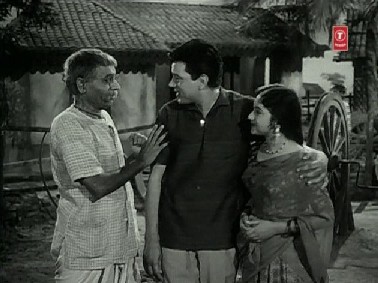
Vijay is being surreptitiously courted by the village casanova Balam (Pran). Balam will flirt with just about anything in a lehenga, and has already gotten one girl pregnant and is busy milking another of all her money. Vijay doesn’t know this, and thinks the world of Balam.
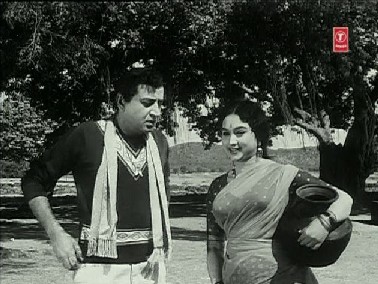
Raj, meanwhile, is trying to save money by moving out of the expensive college hostel. He discovers that the public prosecutor, Choudhary Hukumat Rai (Ashok Kumar) has a room to offer for rent. On his way to Hukumat Rai’s house, Raj hitches a ride with Hukumat Rai himself, unaware of who the man is. Hukumat Rai tells Raj that he knows the public prosecutor, and warns Raj that the public prosecutor’s wife will never rent a room to a bachelor, because she has a young daughter. He persuades Raj to say he’s married, and offers to accompany Raj to the public prosecutor’s home to put in a word for him.
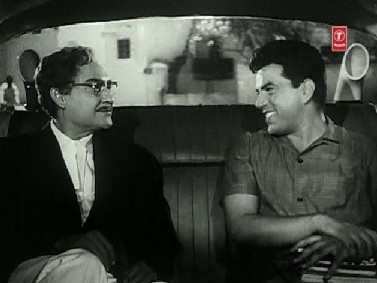
Of course, when the public prosecutor’s wife (Sulochana Chatterjee) and daughter Shanti (Mala Sinha) appear, Hukumat Rai’s identity is revealed—but he continues the charade, convincing his wife and Shanti that Raj is married and soon to be a father. Mother and daughter approve wholeheartedly of Raj.
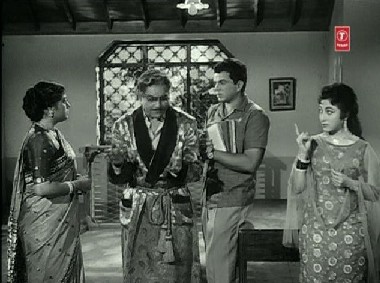
A few months later, Shanti gives Raj a lift to his college, and he inadvertently leaves his diary behind in her car. Shanti, who’s too infatuated to have scruples, reads it and discovers that Raj is both unmarried as well as in love with her. Eventually, all is revealed and everything is happiness and light for all concerned. I’m happy too; I don’t mind silly and frothy as long as it’s happy.
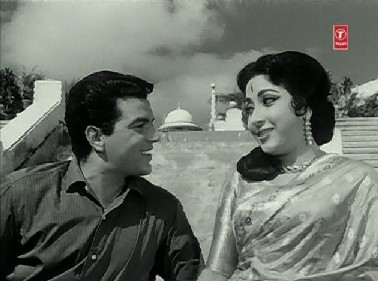
But it can’t last, of course, and just as Hukumat Rai and his wife are bestowing their blessings on Raj and Shanti, Raj receives a telegram from Vijay, informing him that Hansraj is dying of tuberculosis.
Raj goes to the village with Shanti and her parents. There, with his dying breath, Hansraj begs Raj to take care of Vijay—that is, get her married. Once he’s dead and cremated, Shanti and her parents return to the city, and Raj sets about finding a bridegroom for Vijay. He sees her with Balam, but though he tries to dissuade her (he knows Balam’s reputation), Vijay is adamant.

Raj goes to meet Balam’s parents (Shivraj and Leela Chitnis), and they come up with a novel idea: they’ll agree to Balam’s marrying Vijay if Raj will give them enough money to get their daughter Gauri (Nimmi) married off. Since she’s blind, they say, nobody will marry her unless given a major incentive to do so. Arrrrggggh!!
Balam comes by and incites his parents into making Raj agree to marry Gauri himself. Balam does this (as he tells his sidekick Khatpatiya—Mohan Choti) to stop his own wedding to Vijay. I can’t see how Raj marrying Gauri will prevent Vijay marrying Balam, but never mind.

Raj goes to Shanti’s home with the bad news, and even though all of them are pretty devastated, they try to empathise. Shanti tells Raj she doesn’t blame him, but once he’s gone and gotten married, she tells her parents she doesn’t want to get married to anyone else, and would rather study law. I can see crime looming on the horizon; there has to be a reason for Shanti becoming a lawyer.

Years pass; Shanti is now a lawyer; Vijay is regretting having married Balam; and Gauri is being a self-sacrificing martyr. [Aside: Nimmi was so good at this. She did the weepy heroine act in I don’t know how many films—Aan, Pooja ke Phool, Mere Mehboob, Amar, Barsaat—and it never fails to irritate me. The tears and the trembling lower lip, combined with the “You are my god and I will worship you no matter how nasty you are” attitude makes me see red.]
Gauri had discovered on her wedding night (when Raj was muttering in his sleep) that he’d given up his love, Shanti, for Gauri. Gauri therefore has been egging Raj on to bigamy. What a loser.

Raj keeps losing his temper at Gauri, mostly because, being blind, she can’t do much in the way of housework. Kinda nasty of him, I think—and so does Shanti, who arrives one day in response to a remorseful letter from Vijay, who (justifiably) feels she’s to blame for much of their misery. Shanti takes it upon herself to reconcile Raj and Gauri. She does this by singing a song, berating Raj for being mean to Gauri. Ho-hum.

Raj and Gauri come together (and how—the next we know, Gauri’s pregnant. This film moves in leaps and bounds). But Balam’s old girlfriend, the one from whom he’d been drawing money, has decided it’s time for a showdown, and she comes back into his life with a bang.

At this point, I sit up a bit because things have started to get exciting. There’s a crime (ha! I knew it!), and then of course Shanti holding forth in the courtroom, etc. But really, even though most of the ends are tied up neatly, the film leaves me feeling nauseated. There’s too much self-sacrifice, too much melodrama and tears. Nope, not something I’d see again.
What I liked about this film:
Nothing, unless you count a good-looking male lead and a very villainous villain (Pran is great). The music, by a composer I usually like—Madan Mohan—is all right, but not spectacular. And, as I mentioned, though the first half hour or so is enjoyable, the rest of it is irritating enough to negate it all.
What I didn’t like:
Vijay (talk about a blinkered existence).
Gauri (who just got more and more unbearable as time passed).
Whoever thought up the crime angle of the film. The courtroom scenes are especially daft—the arguments so don’t make sense that I was tempted more than once to just stop the whole farce and eject the DVD. Terrible.

This sounds like a Red Mist Movie (ie I would not be able to get through it because a red mist would rise up in front of my eyes, obscuring it forever thank goodness!)…what a tragic waste of Dharmendra and Pran (I have never been able to get on the Mala Sinha train for some reason).
LikeLike
It’s a Red Mist movie all right – it’s awful. I thought Chhoti Bahen was weepy, but at least that had great music to redeem it, as well as Mehmood and Shubha Khote – but this one didn’t even have that. And yes, even though I usually like Mala Sinha, I think I’ve had about as much of her as I can take…
LikeLike
Thanks for the warning. I had this in my induna shopping cart for some reason, but I’ve definitely removed it now.
LikeLike
Well done. :-) I wouldn’t want anyone to inflict this film on themselves. Awful!
LikeLike
Poor you! To restore your faith in Dharmendra-Mala Sinha try Aankhen – but all their other movies are best avoided.
LikeLike
Yes! Aankhen, in fact, is the first Dharmendra-Mala Sinha movie I first saw, and I’ve seen it I don’t know how many times since. Such a delightful movie: utterly impossible, but definitely among the most entertaining `spy thriller’ films Bollywood did in the 1960’s. Love it!
LikeLike
This looks pretty awful, well done for giving it the benefit of the doubt though (and writing about it, thereby saving the rest of us from having to find out for ourselves how bad it is). I have only seen one Dharam/Mala film (‘Anpadh’) and it wasn’t good – it was ‘draggy’, preachy, and just not fun… plus Dharmendra’s character was pretty appalling (very mean to his wife, kinda like ‘Raj’ in this one). I will give ‘Aankhen’ a try and then say goodbye to Dharam/Mala pairing.
LikeLike
Oh, thank you for warning me off Anpadh. I had it on my list of must-sees but after what you’ve said, I don’t think I want to see it.
I tend to begin watching Dharmendra or Shammi Kapoor or Shashi Kapoor movies with the premise that this is something I’m going to enjoy. Invariably, any trace of weepiness or other morbidity really gets my goat. The higher the expectations, the worse the disappointment. :-(
LikeLike
good old mera pathi mera devta hai!
LikeLike
Yuck! ;-)
LikeLike
You know, I saw Pooja Ke Phool again a few days back at age 55. Even 10 years back I wouldn’t have been able to tolerate this heavy-sacrifice ridden drama. But now, with the tolerance I think age has brought in, I was actually able to enjoy the film.
LikeLike
Then maybe I should wait for some time and see it again! Though I must admit that I can never tell how I’ll view a film over time. I have become more tolerant of some films which I’d originally seen as a teenager (probably because they were too profound for me to understand at that time), but on the other hand, I’ve become more impatient with some films – perhaps plot holes and mindless self-sacrifice have begun to pall on me more than they did back then. Life does that you, I guess.
LikeLike
Age has made me react less from the gut I think. Also, now I tend to enjoy the good parts and sort of ignore the bad ones. So, I find myself less concerned about the overall plot, the ‘message’ etc… with regard to Hindi films I mean. I watch other cinema very much with a preying critic’s sensibilities :-).
LikeLike
“Also, now I tend to enjoy the good parts and sort of ignore the bad ones.”
I’m going to have to train myself to do that!
LikeLike
I just realised that it has this beautiful ‘Meri aankhons e koyi neend liye jaataa hai’
LikeLike
Yes, it is beautiful. The first song that appears in the film.
LikeLike
I was looking up movies to watch when my next bout of sleeplessness attacks; after Aasra (which I will be reviewing soon), I began to think better of Mala Sinha, and YouTube ‘recommended’ this one. Thank heavens I put a search for the film’s synopsis and came across your review of it! Even my insomnia will get insomnia (or nightmares) if I watch this one!
LikeLike
Thank goodness you did read this review before watching the film! It’s terrible. I wanted to hit several people here. Really hard.
LikeLike
i am such a huge fan of mala dharmedar pair that i can watch this movie just for them. if we see logo of AVM productions and gemini studio we know we will see rona dhona. mala ji like nanda ji helped new comers like dharam, manoj and rajesh by working with them. i watched himalaya ki godd accidentally. i realized in dancing roles she is over the top. but in serious roles she is amazing. mala ji is big fan of dev saheb. i remember she was once saying that rajesh copied mannerism of dev saheb. i liked her in gumrah, pyasaa , 36 ghantey and my favourite flim of hers aankhen.
LikeLike
i feel mala sinha ji has golden heart. she is warm hearted beauty . i feel this from her smile and expressions in emotional scenes. in this movie name of niece shocks me it is vijay. male name.
LikeLike
Saw it recently as Epic channel in India is airing some old films in their noon slot. As I said in my comment for Pyar Ka Sapna too, I wonder if these melo-drama husband worshipping films worked as inspirations for current desi soap writers, Ekta Kapoor et al. Find many similarities!
However, saw it as I like Dharmendra (oh so dashing in most 60s films) and Mala Sinha is a favorite. I liked that she worked as a lawyer, and the lunch scene in court between her and Ashok Kumar was funny (incidentally, she has done a lot of films with Ashok Kumar too). The plot, songs etc. were mostly too blah to write much about. But I am definitely more tolerant (or have a higher threshold for silly drama in 60s films. The 80s ones get to me!).
LikeLike
Yes, Mala Sinha acted in a lot of films with Ashok Kumar, didn’t she? Opposite him, and as daughter, or with him in loco parentis.
I agree about silly drama in films from the 60s versus their equivalents from the 80s. The 80s were the nadir of Hindi cinema, as far as I’m concerned: so few good films! In the 60s, on the other hand, there was invariably something to recommend the film. Good songs, some eye candy… something. The number of films which were absolutely without any redeeming features were few and far between.
LikeLike
Where was the song “ab do dilon ko…’ shot? It is a or are lovely Mughal style gardens.
LikeLike
No idea where that is. Maybe somewhere in Southern India – they certainly don’t look at all Mughal.
LikeLike